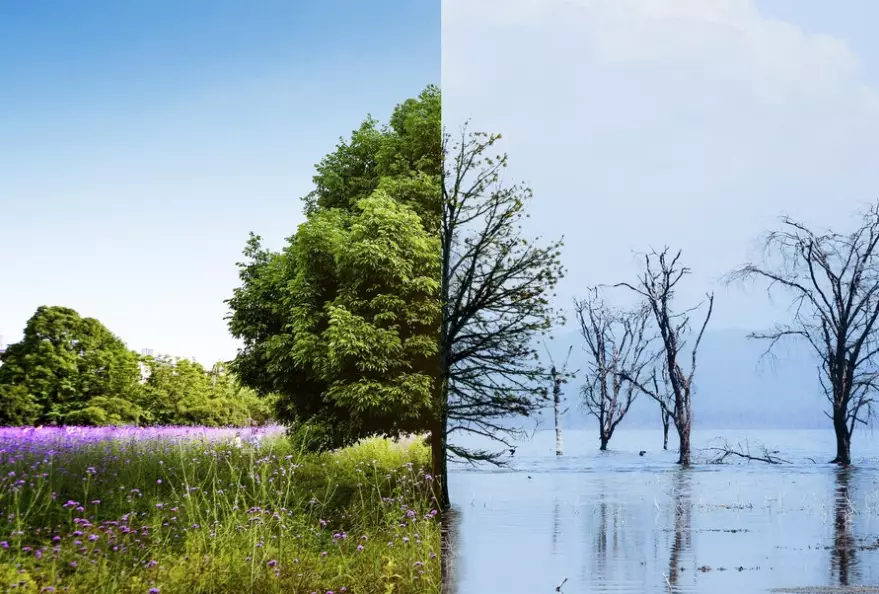Headline: freepik.com
Brilio.net - Recently, climate change has become increasingly worrying. Changes occur significantly and have an impact on the human environment. Rising global temperatures are causing extreme heat waves. Reported by brilio.net from greenpeace.org, the 6th IPCC synthesis report (AR6) published in March 2023 said that human activities through greenhouse gas emissions have resulted in global warming, with global surface temperatures reaching 1.1 C above 18501900 in 20112020.
This is illustrated by the state of world climate change, such as floods and heat waves throughout Africa, major floods in the southern part of Brazil, drought in the Amazon and the heat that has hit Asia, including India.
In April to May, extreme changes occur due to extreme heat waves. Several Asian countries such as India experience extreme temperatures of up to 47 degrees Celsius, resulting in death and misery.
What is climate change?

photo: freepik.com
Reported by brilio.net from un.org, climate change is a condition that refers to long-term changes in temperature and weather patterns. These shifts can occur naturally, due to changes in solar activity or large volcanic eruptions. However, since the 1800s, human activity has been the main driver of climate change, especially due to the burning of fossil fuels such as coal, oil and gas.
Burning fossil fuels produces greenhouse gas emissions that blanket the earth and trap the sun's heat and increase temperatures. Greenhouse gases are the main cause of climate change including carbon dioxide and methane. Such as using gasoline to drive a car or coal to heat a building.
Apart from that, land clearing and deforestation can also release carbon dioxide. Agricultural activities, oil and gas are the main sources of methane emissions. Energy, industry, transportation, buildings, agriculture and land use are some of the main sectors that cause greenhouse gases.
The average temperature of the earth's surface today is around 1.2C warmer than the temperature in the late 1800s (before the industrial revolution). This temperature is warmer than previous temperatures in the last 100,000 years. 2011-2020 was the hottest decade on record, and each decade in the last four decades has been warmer than the previous decade since 1850.
The current impacts of climate change include, among other things, severe drought, water scarcity, severe fires, rising sea levels, floods, melting polar ice, catastrophic storms, and declining biodiversity.
The impact of climate change on humans

photo: freepik.com
Climate change has a broad and profound impact on human life. Climate change also affects human health. In addition, climate change also worsens air quality and expands the spread of infectious diseases, increasing the burden on public health.
Climate uncertainty disrupts food production and access to clean water, which can lead to life-threatening diseases in humans. Understanding and addressing the impacts of climate change is key to protecting human well-being and ensuring survival in the future. Here are 6 impacts of climate change on humans.
1. Infectious disease

photo: freepik.com
Climate change can make the weather change. Drastic weather changes can increase the risk of infectious diseases by 58 percent. Climate change can cause warming so that mosquitoes, ticks and other disease-carrying insects breed.
In addition, climate change can cause storms, floods and extreme weather events. Extreme circumstances also risk the emergence of viral diseases, such as hantavirus, adenovirus and so on.
2. Heart disease

photo: freepik.com
Climate change can also cause extreme heat which is linked to an increase in heart attacks, strokes and other cardiovascular diseases. The cause of extreme heat can cause the body to sweat more, dehydration and other illnesses.
If more body fluids are released, the blood becomes thicker so it has to force the heart to work harder.
3. Dementia

photo: freepik.com
Climate change is making forest fires more frequent and more severe. Particles that are inhaled and enter the lungs can have negative long-term impacts. Other impacts can occur on human cognitive abilities.
4. Chronic kidney diseaseFor those who always do outdoor activities, the heat caused by high climate changes can have a bad impact on the kidneys. In very hot weather, diseases that can be infected by extreme weather are urinary tract infections, kidney stones and acute kidney injury.
5. Mental health problemsClimate change not only affects physical health but also has a significant impact on people's mental health. More frequent and severe natural disasters such as floods, forest fires, and hurricanes cause psychological trauma, post-traumatic stress (PTSD), anxiety, and depression. People who lose their homes, possessions, or even loved ones in these disasters often experience deep emotional distress.
6. Respiratory diseaseClimate change has a significant impact on human respiratory health, exacerbating existing conditions and triggering new diseases. Rising global temperatures and changing weather patterns are contributing to increasingly worsening air quality, with air pollution and an increase in allergens posing serious threats.
Additionally, climate change is also lengthening the allergy season and increasing concentrations of allergens such as pollen, which can trigger asthma attacks and respiratory allergies. Extreme weather such as heat waves and forest fires also releases dangerous particles into the air, worsening respiratory conditions and increasing health risks, especially for vulnerable groups such as children, the elderly and people with chronic diseases.
(brl/far)